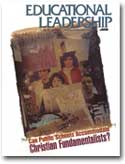Thomas Paine called the bleak years of the American Revolution “times that try men's souls.” These days our souls are being tried in a different way. In hundreds of communities educators are hampered in their efforts to make needed changes—whole language, integrated curriculum, cooperative learning, performance assessment, outcome-based education—by opposition from parent and community groups who see these innovations as contrary to their religious values.
Understandably, educators resent irrational attacks on programs they have worked hard to develop, programs representing educational values they believe in. They deplore the unscrupulous political tactics (such as late-night phone calls to board members at their homes, unreasonably burdensome requests for information, and “stealth” election campaigns) used by some groups, and they are offended by distortions of their ideas and actions that sometimes seem intended primarily to erode confidence in public education.
In the publications I edit, I try to ensure that factual statements are accurate and claims are documented, and I am disturbed when I see misrepresentations and irresponsible accusations in print. But two recent experiences have given me a new perspective.
You may remember the Tennessee court case (Mozert) from the 1980s in which Fundamentalist parents demanded that the schools provide an alternate set of reading textbooks for their children. I thought I understood the dispute until I read Battleground (1993), a new book by Stephen Bates, a graduate of Harvard Law School.
The case revolved around parent Vicki Frost, who wouldn't allow her children to read the textbooks adopted by the district because, she said, they taught witchcraft, one-world government, and humanism. Judge Hull, who was later overruled unanimously by a panel of three federal judges, decided that the Frost children should be excused from reading classes in which the Holt series was used. But instead of making the schools responsible for providing an alternative reading program, as the parents wanted, Judge Hull said the parents would have to provide alternative instruction outside of school hours.
Bates explains the fine points of the Hull decision and the events leading up to it with the drama and flair of a popular novelist, but he maintains a consistently balanced point of view. For example, he portrays Vicki Frost, the parent whose concerns sparked the conflict between a few Fundamentalist parents and the local school board, as narrow-minded and provincial, but also capable, respectful of her opponents, and courageous. Though I consider her views untenable, I found myself admiring her determination to live out her principles, even when she was ostracized by her neighbors. And I concluded after reading the book that if the local school board had taken the position that Judge Hull proposed, the court battle might not have been necessary in the first place.
We really don't know whether compromise was possible in that case, but I had a personal experience recently that showed me that it is possible to have a dialogue with national leaders of evangelical Christian groups. Some months ago I wrote to Bob Simonds, head of Citizens for Excellence in Education, pointing out what I thought were inaccuracies and excesses in a book published by CEE (Hudson 1992), such as a statement that outcome-based education is “only another name for Mastery Learning.”
Because I had not received a response to my letter, I called Simonds a few days ago and was pleased to find that the book has been thoroughly revised. He faxed me a copy of the new section on outcome-based education. It still reflects doubts about OBE, but its treatment of the subject is quite fair.
As Charles Haynes (p. 30) says, “Given the lack of civility in the public square of America today, it is not easy to build bridges of understanding and trust, but it can be done.”
